#jewish history
Text


Louise Catherine Breslau (deceased)
Gender: Female
Sexuality: Lesbian
DOB: 6 December 1856
DOD: 12 May 1927
Ethnicity: Polish Jewish, German Jewish
Nationality: German / French (she moved around a bit)
Occupation: Artist
Note: Due to her success at the Salon and favorable notice from the critics, Breslau received numerous commissions from wealthy Parisians. She joined the Salon de la Société Nationale des Beaux-Arts in Paris in 1890, not only exhibiting in its salons but also serving on the jury. She eventually became the third woman artist, and the first foreign woman artist to be bestowed France's Legion of Honor award.
#Louise Catherine Breslau#Lesbian Visibility Week#lgbt history#lesbian history#jewish history#lesbianism#lgbt#female#lesbian#1856#rip#historical#jewish#ashkenazi jewish#german#french#artist#first#popular#popular post
159 notes
·
View notes
Text
hehehehe i got a thermal label printer that can handle Yiddish/Hebrew letters
time to label everything in the house with Yiddish vocabulary words :3
133 notes
·
View notes
Text
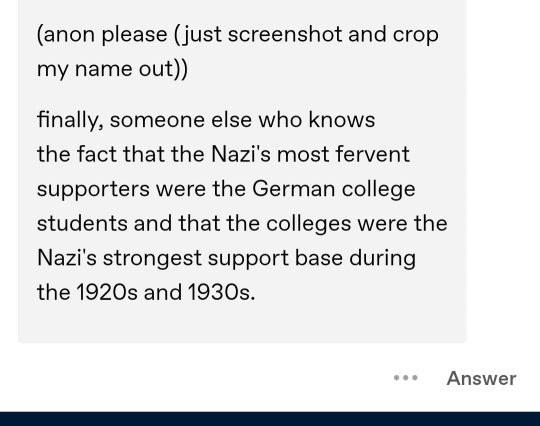
Exactly, Anon. Exactly. This is why the Ivy League Universities being turned into Hamasnik terrorist bases is so horrifying. Especially with Jew-hating students attacking Jewish students and professors on campus, with the Universities' sanction. The Universities could shut these Jew-hate riots down. The fact that they don't shows that they want them to continue. They're trying to chase away the Jewish students and professors from these schools. That's always the first step. That's what the Nazis did first, too.
This article is taken from the US Holocaust Memorial Museum website. I highly recommend that everyone read the whole article. But even if you read the first paragraph, you'll see the parallels to what is happening on Ivy League campuses today:
.
After Adolf Hitler was appointed German Chancellor in January 1933, the new Nazi government began an effort to completely reorder public and private life in Germany.
The Nazi regime quickly targeted German universities—among the most elite in the world at the time—for restructuring according to Nazi principles. While the Nazi Ministry of Education initiated reforms, local Nazi organizations and student activists worked to bring Nazi ideals to German campuses. These forces, along with increasing antisemitism under Nazi rule, transformed everyday life at German universities. Throughout this period, students, faculty, and staff made individual decisions that both upheld and opposed Nazi ideology.
With the passage of the "Law for the Restoration of the Professional Civil Service" in 1933, most Jewish professors in Germany were dismissed from their positions. Others, such as Professor Eugen Mittwoch, were able to keep their posts temporarily only due to the political value of their research. After purging Jewish and "politically undesirable" faculty, the regime then targeted the student body with the "Law Against Overcrowding in Schools and Universities." As German authorities continued to "Aryanize" German universities, Jews increasingly lost the opportunity to teach or study. Many non-Jewish Germans sought to benefit from their persecution.
The daily business of university life continued in the wake of these new policies, but political concerns increasingly influenced the way professors and students worked and studied. The practice of denunciation, as demonstrated by the "Request for the Investigation of Professor Hans Peters," illustrates the danger posed to both students and faculty if they failed to follow new ideological norms. Those willing to voice support for the new regime—whether out of enthusiasm or practicality—often received promotions or other rewards. Meanwhile, many others quietly accepted the new policies and passively benefited from the persecution of their Jewish peers. Very few, such as the small student group in Munich known as the White Rose, took any significant action to resist the Nazi dictatorship.
The Nazi government and its supporters manipulated several aspects of the country's traditional university system to turn German higher education into a crucial source of support for the new regime. For example, the German student population had been largely male long before the Nazi rise to power, and German campuses were dominated by fraternities. Those organizations maintained traditional military discipline and dress codes, and their alumni groups exercised significant political power both before and after 1933. Fraternities—often working with the Student Council and Nazi Student League—served as a powerful and violent force for implementing Nazi principles at universities, often going beyond the party platform in their radicalism. A Report on the Camaraderie House for Female Students of Göttingen shows how Nazi student groups used the format of traditional student organizations to train both men and women to become the next generation of Nazi leaders.
Although the regime could rely on many committed student activists, the Third Reich also sought the support of German professors to lend legitimacy to their policies. Because German universities were state institutions, professors' academic careers became vulnerable to the whims and wishes of the Nazi state. While only a small minority of professors had been Nazi Party members before 1933, several prominent professors quickly voiced their support for the Third Reich. In the new German university, political loyalty was valued over academic ability in the assessment of students and in the selection and promotion of professors. Authorities infused university classrooms with Nazi ideology—as shown in the document, "Foundation of the Advanced School of the German Reich". But prioritizing politics over academics affected the quality of German higher education.
Nevertheless, professors—even enthusiastic supporters of the new regime—often spoke out against some aspects of Nazi policy. The case of Eduard Kohlrausch shows how his opposition to student-led book burnings caused his removal from the university administration. Dissent against individual policies, however, did not give rise to any concerted resistance movements. German universities as a whole formed a solid base of support for the Nazi regime, contributing valuable knowledge to the development of technology for the war effort as well as logistical support for the Holocaust.
The Nazification of universities overwhelmed the daily lives of students with new requirements, including mandatory lectures, physical exercises, labor duties, and political assemblies. Many students resented those requirements, even if they supported the Nazi Party. In Heidelberg, for example, where the daily life of students was dominated by political instruction and mandatory physical training, large numbers of students withdrew from the university in search of other educational opportunities. As illustrated in the "Memo Regarding Maria-Elisabeth Koch," students also showed varying degrees of enthusiasm for the labor service that was often required of them in territories occupied by Nazi Germany.
The Nazi government's project of remaking German universities was broadly successful, but it produced unintended consequences. The quality of education suffered significantly as classes were regularly cancelled for political assemblies and students' schedules became filled with ideological and paramilitary training. Moreover, purging Jewish faculty deprived German universities of valuable expertise. Within a few years, many observers in Germany and abroad became deeply skeptical about the quality of German higher education in the Third Reich. Propaganda efforts such as the Carl Schurz tour for American professors and students—documented with a slickly produced video—did not prevent protest. The 550th-anniversary celebration of Heidelberg University met with opposition in Europe, even while prominent American universities such as Harvard accepted invitations.
With the defeat of the Third Reich in 1945, Allied forces occupying Germany began a long-term effort to remove the influence of Nazi ideology in German society. Many German academics who made significant contributions to the Nazi war effort fled to the United States, where they lived comfortable lives and their expertise was highly valued by American universities and the US military. In postwar Germany, many faculty and students who had benefited from the Nazis' discriminatory policies without being especially vocal or enthusiastic supporters of the regime sought to cast their dissent or their silence as forms of political resistance to obscure their own complicity. Although many Germans denied having supported the Nazi regime, antisemitism persisted in postwar Germany. The case of Hermann Budzislawski shows the difficulties encountered by the relatively few German Jews who decided to return to Germany after World War II.
Sources in this collection document the choices facing students and faculty pursuing their everyday lives in the shadow of Nazism and the Holocaust. Over the course of this period, as antisemitic discrimination escalated to mass murder, the higher education system proved to be a source of support—rather than opposition—to the party's project of remaking German society.
#jumblr#jewish history#the goyim are trying to speedrun the 1930s#goyim have always naively asked “How could the Nazi regime have murdered 6 million Jews??” - and now they're giving us the answer#Jew-hate makes you stupid#NOTE: I report and block antisemites. Any antisemites who comment on this post will be reported and blocked. You have been warned.
53 notes
·
View notes
Note
Hi!
Do you know if there's any Jewish history in EH? There are a lot of old (pre-Inquisition) Jewish buildings/art in Spain, Catalonia, and Portugal, but I'm not sure if there are EH. I'm just curious, since I've learned a lot about Jewish life in Spain before the Inquisition, but never about Jewish life in EH, if there even was any.
Thank you!
Kaixo and thanks for your message!
Of course there's Jewish history in EH! In Gipuzkoa there never was a big community, as well as in Araba, with the exception of Guardia. In Bizkaia, Balmaseda was the biggest center for Jews, but sadly they were forcibly expelled around 40 years prior to the expulsion from Castile. Jewish people flourished mainly in the southern side of Nafarroa in Muslim times: there were thriving Jewish communities in Lizarra, Tutera, Tafalla, even Iruña.
Luckily this didn't change after the Reconquista! Jewish people were mainly merchants and moneylenders - profession banned for Christians - and they would work with peasants and nobility alike. They were also wine makers, and this wine was very much appreciated not only in the kingdom of Navarre, but also in Aragón and Castile. Navarrese kings supported Jewish communities and welcomed any Jew from other region.
There's a tragic but moving story about this time. The Jewish community of Gasteiz was forced to leave, but they agreed to hand over their cemetery to the city on the condition of respect the ground and don't build on it. The promise was respected for 460 years until 1952, when Jewish representatives agreed with the town hall that the ground was available for any use. Nowadays, it's a park with this monument to Jewish people. The neighborhood is called Judimendi, "the mountain of Jewish people".
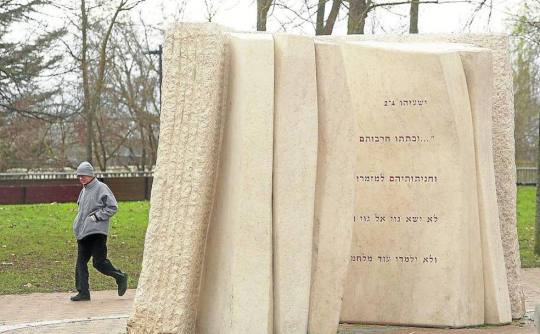
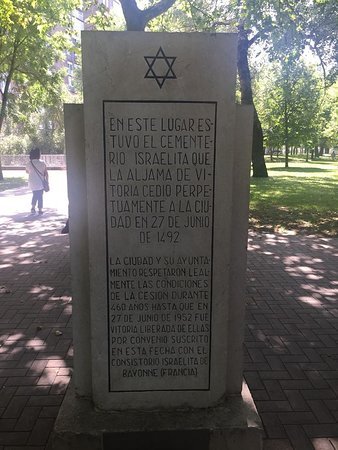
In fact, when the kingdom of Castile ordered the expulsion of Jews from Castile, most of them moved to the kingdom of Navarre. But after the conquest by Castile in 1512, Jews and Muslims were effectively expelled from their home. Most of them didn't go too far, just across the border, to Baiona.
Baiona welcomed Basque, Spanish and Portuguese Jews, gathering a very important community that led to call the town the little Jerusalem at one time. There's a much modern legacy there than south the border, for example, there's still a functioning synagogue.


After the French revolution, Jews were reocgnised the same rights and duties than any other French, so they kept their businesses and in Baiona, many of them devoted themselves to chocolate - still one of the best in Europe, I must add.
But during WW2 and nazi occupation, maaaany of these Jewish people were captured and led to extermination camps. The community didn't die, though, and they welcomed a new wave of Jewish refugees in the 60s due to the French-Algerian war.
René Cassin, one of the fathers of the Declaration of Human Rights, was a Jew from Baiona, btw.
Nowadays in Euskadi there are just around 300 Jews, while in Iparralde this figure is bigger but not super high (just around ~3,000 in the whole Aquitaine).
44 notes
·
View notes
Text
I will tell you the reason: they are lacking meaning in their lives and it is fulfilled by protests
youtube
Imagine if they used half that energy to help their community: clean the streets, go to city planning meetings, organized a party or literally anything that would improve their and their friends' lives
#gaza#israel#hamas#israel palestine conflict#gaza strip#palestine#palestinian#hammas is isis#jerusalem#israel news#israeli#i stand with israel#pro israel#jewish history#jewish#jewblr#jewish tumblr#jumblr#am yisrael chai#judaism#טאמבלר ישראלי#טמבלר ישראלי#ישראל#ישראלבלר#ישראלים#עם ישראל חי#עברית#חרבות ברזל#ישר#ישראבלר
21 notes
·
View notes
Text

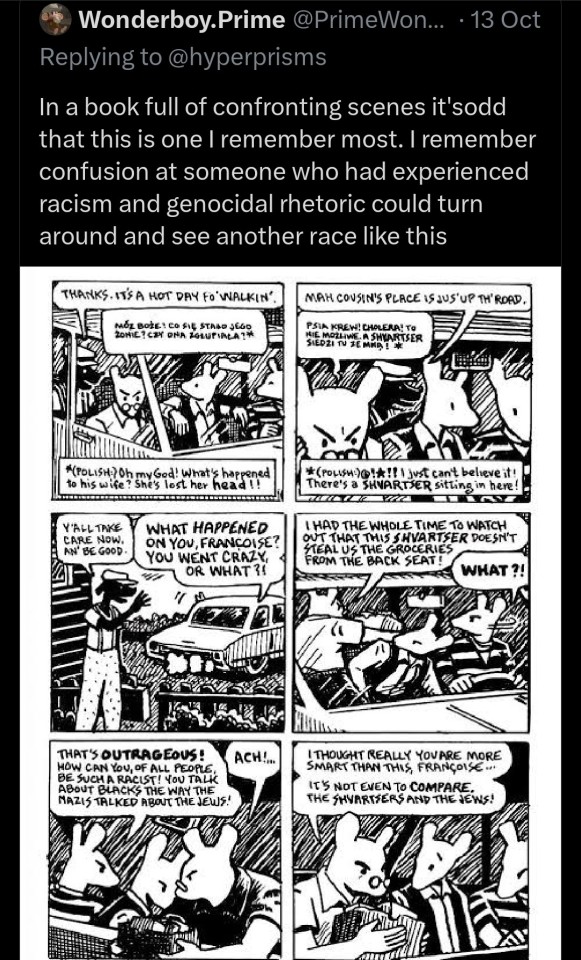
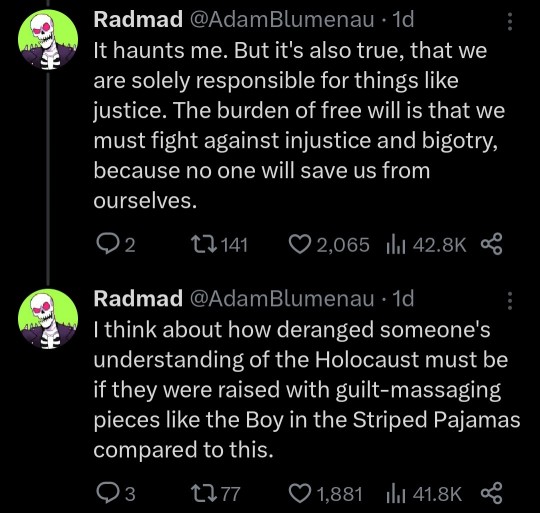




18K notes
·
View notes
Text

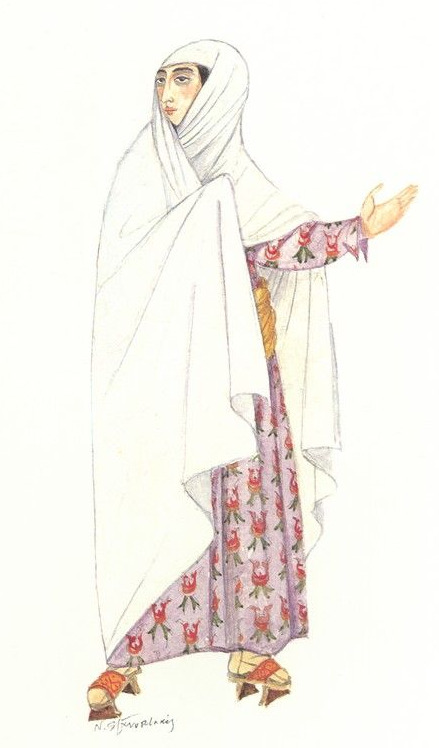
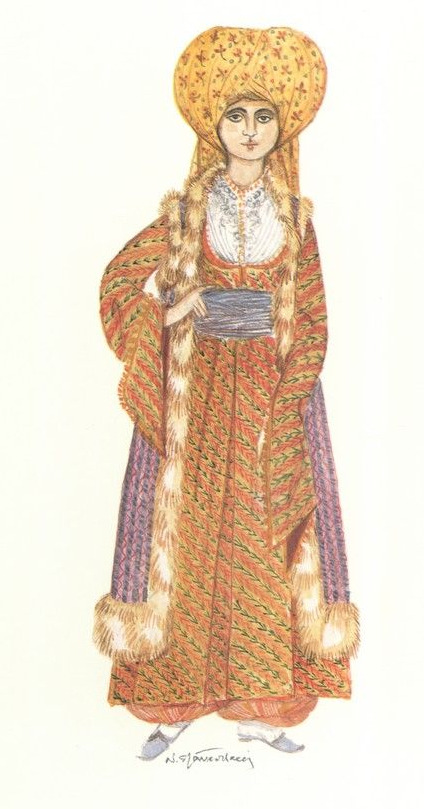

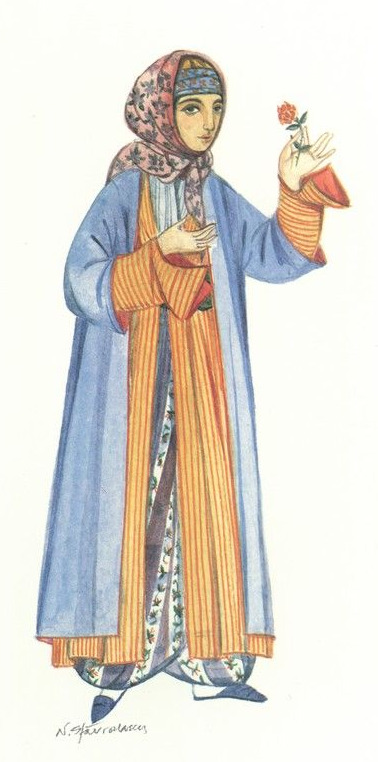
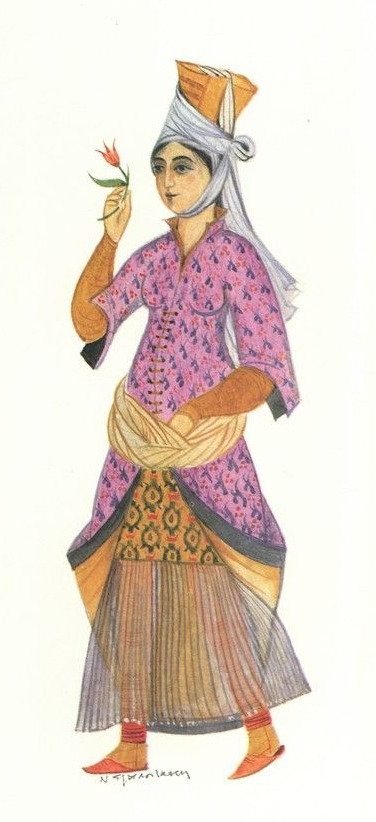
Sephardi & Romaniote Jewish Women's Clothing in the Byzantine and Ottoman Periods, illustrated by Nikos Stavroulakis
#jumblr#jewish#jewish art#jewish women#jewish history#sephardim#romaniotes#art#these are from all over. byzantium/constantinople/istanbul and smyrna/izmir and rhodes and adrianople/edirne and thessaloniki etc#shoutout to a fellow edirne girlie in the top right.#my posts
5K notes
·
View notes
Text

פֿון פֿאָרווערטס, נאָוועמבער 19, 1936
6K notes
·
View notes
Text
There is a massive historical discourse issue when it comes to Israel-Palestine and yeah it pisses me off, firstly as a Jew, second as someone who is pursuing a degree in Jewish history.
You can see a part of it by looking at the historical narrative presented by a very popular source, DecolonizePalestine. This source has been shared widely by celebrities, by activists. It has been quoted to me on this website. It was even in the instagram bio of one of my TA's. It is considered a helpful and trustworthy source on Israel-Palestine.
The website has a Palestine 101 section, which includes this helpful module:

okay lets take a look:

I've never heard of the Peselet tablet, so let's do a quick google.
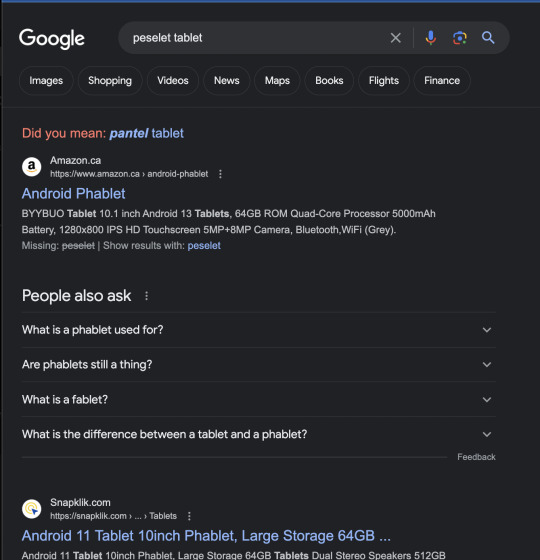
Huh. That's weird.
There actually is a 3,000 year old Egyptian tablet (stele) that talks about the levant though.
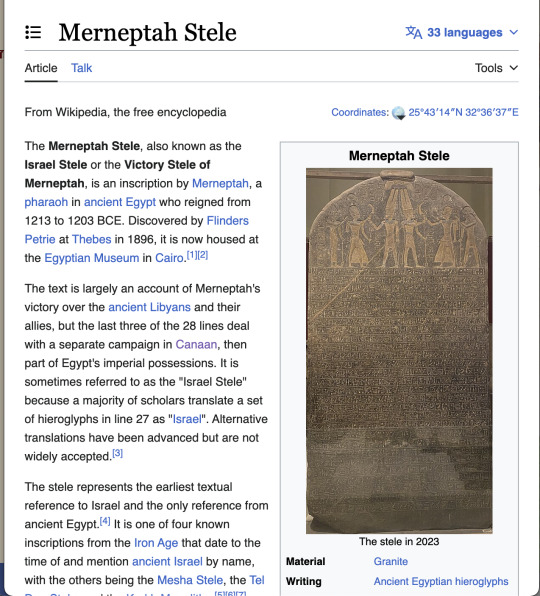
Oh no! Anyways. Lets move on:

I'm sorry but how do you mention the Assyrians without mentioning that they destroyed the ancient Kingdom of Israel. And the Persians without mentioning that they allowed for the end of the Babylonian exile and the building of the second Jewish temple in Jerusalem . And the Romans without mentioning what they named their province in the levant. Judea. This is where the name "Jew" comes from. There isn't a J in Hebrew.
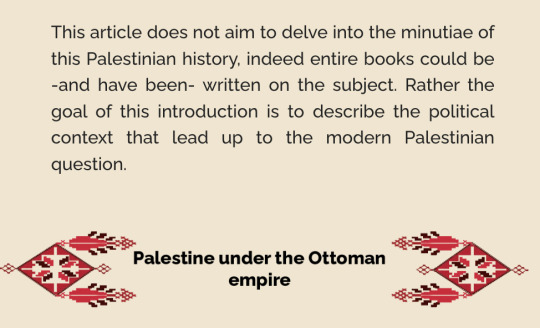
wait the ottomans???? We already got to the Ottomans??? We just skipped literal centuries.
There's clearly a narrative being created here, not by the inclusion of historical facts, but rather the purposeful omission of historical facts. No serious scholar would be able to discuss the history of the levant and COMPLETELY LEAVE OUT THE JEWS.
This is the dominant historical narrative in discourse on Israel-Palestine and it is harmful. Not only because its untrue, but because it involves the destruction of Jewish history and the right of Jews to steward our own history.
Where we come from is and has always been a huge part of Jewish identity. I cannot stress this enough. It is wrong and yes, it is antisemitic to warp and erase Jewish history for your own political purposes.
and here's what gets me: it is completely unnecessary.
You can recognize all the horrors that the zionist movement and Israel has inflicted upon Palestinians without denying Jewish history. You can demand Israel take accountability and stop what it is doing without denying Jewish history. You can advocate for Palestinian freedom, statehood and self determination, without denying Jewish history.
But people don't want to *just* do that. In the minds of many, the only acceptable Free Palestine is a Palestine Free of Jews or Jewish autonomy.
And for that, fuck you. Palestinians are indigenous to the levant. They know their history and where they come from. Jews are indigenous to the levant. We know our history and where we come from.
No one is going anywhere.
Be better.
Free Palestine and Am Yisrael Chai.
2K notes
·
View notes
Text

It’s “listen to Jewish voices” until we start taking a stand against genocide
#palestine#free palestine#gaza#free gaza#jews for peace#israel#from the river to the sea palestine will be free#jvp#jewblr#jewish#jewish history#judaism#oscars#film#free free palestine#hollywood#current events#gaza strip#jerusalem#movies#holocoust
1K notes
·
View notes
Text
Tapping the "your support and solidarity and care for Jews and Romani people and BIPOC should be more powerful than your hatred of nazis" sign so fucking hard rn.
Bcs u should support Jews and Romani people and BIPOC more than u hate nazis and some of u it is very clear that u couldn't give a shite about Jews and romani or BIPOC. You hate nazis but you've forgotten nazis aren't just generalised bigots or bad people and they have an ideology which targets "undesirables" and people who ate racially seen as inferior or less than. Only part of combating white supremacy and fascism is hating nazis and a lot of it is helping communities effected by white supremacy and fascism and listening to and understanding us.
#jew#jewish#judaism#jewish memes#jewish history#jews#jumblr#frumblr#jew stuff#romani#bipoc#blm#black lives matter
5K notes
·
View notes
Text
Antisemitism Required Reading
I get a lot of ignorant comments & tags on my posts about antisemitism, and I’ve already spent way too much time & energy engaging with them. So to preserve my sanity, I’ve made the decision not to engage too deeply with any commenters who haven’t at least read all of these in their entirety:
“Jewish Space Lasers” by Mike Rothschild
“People Love Dead Jews” by Dara Horn
“Jews Don’t Count” by David Baddiel
"More Than a Century of Antisemitism", GEC Special Report
If you’re not Jewish, please read all of this literature before adding anything to my posts about antisemitism.
Jews, please add any books you think should be on the list!
#I'll be adding and updating this post as I find & vet anything I feel should be required reading#antisemitism#people love dead jews#jews don't count#jewish space lasers#required reading#reading list#dara horn#david baddiel#more than a century of antisemitism#mike rothschild#jewish history
1K notes
·
View notes
Text

I have found my new quest.
Someone in a Facebook group I’m in posted this picture of a hanukkiah they saw in a thrift shop and did not purchase. Everyone in the group was telling them to go back and get it. They didn’t recognize what they were seeing.
It’s Yehudit brandishing her sword and the head of Holofernes.
She is being anointed with oil to honor her for her triumph.
On a hannukiah.
I need this so badly I can taste it. 
#yehudit#Yehudit slaying holofernes#aka Judith#judith slaying holofernes#Yehudit the heroine#eat a cheese latke#and think of this brave woman#hanukkah#hanukkiah#menorah#it’s so beautiful#jewish history#Jewish#jewish holidays#jumblr
2K notes
·
View notes
Text
The State Department just published a 51 page report detailing over a century's worth of Russia's exploitation of antisemitism as a tactic to spread disinformation and propaganda
#jumblr#jewish#nesyapost#jews#jewish history#antisemitism#Russian History#Russian antisemitism#Russian jews#soviet jews#history#pdf download#propaganda#Ukraine war#can't wait to dive into this
1K notes
·
View notes
Text
Every single time I hear someone referring to a Jewish person as ‘white’ another little piece of my soul dies.
As a non-American Jew, the first time I ever heard Jews being referred to as white was when I was a full grown adult watching an American reality show. I FOR REAL thought they were making that shit up in order to generate buzz and get people talking about the controversy! That’s how foreign the notion was to me. Imagine my shock and horror to discover that THIS IS A COMMON MISCONCEPTION IN THE UNITED STATES.
It’s the way that referring to Jews as ‘white’ ERASES white people’s antisemitism, it erases our persecution at the hands of white people, it erases our suffering, it erases the OTHERING that Jews had suffered for CENTURIES from actual white people.
Based on what the skin tone of some Jews in a few places might afford them SO LONG AS NO ONE KNOWS THEY’RE JEWISH.
If you have to hide your real identity in order to enjoy the privileges of being perceived as white, YOU’RE NOT WHITE (this is true for Jews just like it is true for other white-passing People of Color).
White passing is not the same as white.
WHITE PASSING IS NOT THE SAME AS WHITE.
Jews are NOT white. Not a single one of us. Not even the ones who can pass as white, let alone all of the Jews who can’t.
#jews#jew#jumblr#jr#jewish#jewish stuff#jewish history#jewish identity#antisemitism#frumblr#white passing#is not the same as white#jews of tumblr#jewish privilege#jews are not white#jewish dignity#jewish people#judaism#antisemites#resources
3K notes
·
View notes
Text
Someone on Reddit made the mistake of saying, "Teach me how this conflict came about" where I could see it.
Let me teach you too.
The common perception is that Jews came out of nowhere, stole Palestinian homes and kicked Palestinians out of them, and then bombed them for 75 years, until they finally rebelled in the form of Hamas invading Israel and massacring 22 towns in one day.
The historical reality is that Jews have lived there continuously for at least 3500 years.
There are areas, like Meggido iirc, with archeological evidence of continuous habitation for 7,000 years, but Jewish culture as we recognize it today didn't develop until probably halfway through that.
Ethnic Jews are the indigenous people of this area.
Indigeneity means a group was originally there, before any colonization happened, and that it has retained a cultural connection to the land. History plus culture.
That's what Jews have: even when the diaspora became larger than the number of Jews in Israel, the yearning to return to that homeland was a daily part of Jewish prayer and ritual.
The Jewish community in Israel was crushed pretty violently by the Roman Empire in 135 CE, but it was still substantial, sometimes even the majority population there, for almost a thousand years.
The 600s CE brought the advent of Islam and the Arab Empire, expanding out from Saudi Arabia into Israel and beyond. It was largely a region where Jews were second-class citizens. But it was still WAY better than the way Christian Europe treated Jews.
From the 700s-900s, the area saw repeated civil wars, plagues, and earthquakes.
Then the Crusades came, with waves of Christians making "pilgrimages to the Holy Land" and trying to conquer it from Muslims and Jews, who they slaughtered and enslaved.
Israel became pretty well depopulated after all that. It was a very rough time to live there. (And for the curious, I'm calling it Israel because that's what it had been for centuries, until the Romans erased the name and the country.)
By the 1800s, the TOTAL population of what's now Israel and Palestine had varied from 150,000 - 275,000 for centuries. It was very rural, very sparsely populated, on top of being mostly desert.
In the 1880s, Jews started buying land and moving back to their indigenous homeland. As tends to happen, immigration brought new projects and opportunities, which led to more immigration - not only from Jews, but from the Arab world as well.
Unfortunately, there was an antisemitic minority spearheaded by Amin al-Husseini. Who was very well-connected, rich, and from a politically powerful family.
Al-Husseini had enthusiastically participated in the Armenian Genocide under the Ottoman Empire. Then the Empire fell in World War One, and the League of Nations had to figure out what to do with its land.
Mostly, if an area was essentially operating as a country (e.g. Turkey), the League of Nations let it be one. In areas that weren't ready for self-rule, it appointed France or Britain to help them get there.
In recognition of the increased Jewish population in their traditional, indigenous homeland, it declared that that homeland would again become Israel.
As in, the region was casually called Palestine because that was the lay term for "the Holy Land." It had not been a country since Israel was stamped out; only a region of a series of different empires. And the Mandate For Palestine said it was establishing "a national home of the Jewish people" there, in recognition of "the historical connection of the Jewish people with Palestine and to the grounds for reconstituting their national home in that country."
Britain was appointed to help the Arab and Jewish communities there develop systems of self-government, and then to work together to govern the region overall.
At least, that was the plan.
Al-Husseini, who was deeply antisemitic, did not like this plan.
And, extra-unfortunately, the British response to al-Husseini inciting violent anti-Jewish riots was to put him in a leadership role over Arab Palestine.
They thought it would calm him down and perhaps satisfy him.
They were very wrong.
He went on to become a huge Hitler fanboy, and then a Nazi war criminal. He co-created the Muslim Brotherhood - which Hamas is part of - with fellow fascist fanboy Hassan al-Banna.
He got Nazi Party funding for armed Muslim Brotherhood militias to attack Jews and the Brits in the late 30s, convincing Britain to agree to limit Jewish immigration at the time when it was most desperately needed.
He started using the militias again in 1947, when the United Nations voted to divide the mandated land into a Jewish homeland and a Palestinian one.
Al-Husseini wouldn't stand for a two-state solution. He was determined to tolerate no more than the subdued, small Jewish minority of second-class citizens that he remembered from his childhood.
As armed militias increasingly ran riot, the Arab middle and upper classes increasingly left. About 100,000 left the country before May 1948, when Britain was to pull out, leaving Israel and Palestine to declare their independence.
The surrounding nations didn't want war. They largely accepted the two-state solution.
But al-Husseini lobbied HARD. And by mobilizing the Muslim Brotherhood to provide "destabilizing mass demonstrations and a murderous campaign of intimidation," he got the Arab League nations to agree to invade, en masse, as soon as Britain left.
About 600,000 Arabs fled to those countries during the ensuing war.
Jews couldn't seek refuge there; in fact, most of those countries either exiled their Jews directly, confiscating their property first, or else made Jewish life unlivable and exploited them for underpaid or slave labor for years first.
By the time the smoke cleared and a peace treaty was signed, most of the Arab Palestinian community had fled; there was no Arab Palestinian leadership; many of the refugees' homes and businesses had left had been destroyed in the war; and Israel had been flooded with nearly a million refugees from the Arab League countries and the Holocaust - even more people than had fled the war.
That was the Nakba. The one that gets portrayed as "750,000 Palestinians fled or were expelled!" in the hope that you'll assume they were expelled en masse, their beautiful intact homes all stolen.
Egypt had taken what's now the Gaza Strip in that war, and Jordan took what's now the West Bank - expelling or killing all the Jews in it first.
(Ironically, Jordan was originally supposed to be part of Israel. Britain, inexplicably, cut off what would have been 75% of its land to create Jordan.
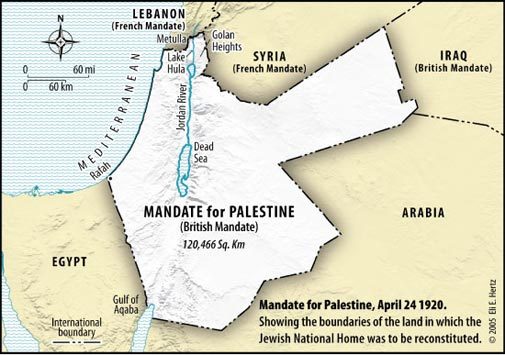
Even more inexplicably, nobody ever talks about it. I've never seen anyone complain that Jordan was stolen from Palestinians. Possibly because Jordan is also the only country that gave Palestinian refugees full citizenship, and it's about half Palestinian now.
Israel is nearly 25% Arab Palestinians with full citizenship and equal rights, so it's not all that different -- but the fundamental difference of living in a country where the majority is Jewish, not Muslim, probably runs pretty deep.)
Anyway: that's why Palestine is Gaza and the West Bank, rather than being some contiguous chunk of land. Or being the land set aside by the U.N. in 1947.
Because Arab countries took that land in 1948, and treated them as essentially separate for 20 years.
Israel got them back, along with the Golan Heights and the Sinai Peninsula, in the next war: 1967, when Egypt committed an act of war by taking control of the waterways and barring Israel from them. It gave the Sinai back to Egypt as part of the 1979 peace accords between Egypt and Israel.
Israel tried to give back the Gaza Strip at the same time. Egypt refused.
Palestine finally declared independence in 1988.
But Hamas formed at about the same time. Probably in response, in fact. Hamas is fundamentally opposed to peace negotiations with Israel.
Again: Hamas is part of a group founded by Nazis.
Hamas has its own charter. It explains that Jews are "the enemy," because they control the drug trade, have been behind every major war, control the media, control the United Nations, etc. Basic Nazi rhetoric.
It has gotten adept at masking that rhetoric for the West. But to friendlier audiences, its leaders have consistently said things like, "People of Jerusalem, we want you to cut off the heads of the Jews with knives. With your hand, cut their artery from here. A knife costs five shekels. Buy a knife, sharpen it, put it there, and just cut off [their heads]. It costs just five shekels."
(Palestinians were outraged by this speech. Palestinians, by and large, absolutely loathe Hamas.
It's just that it's not the same to say that to locals, as it is to say it where major global powers who oppose this crap can hear you.)
Hamas has stated from the beginning that its mission is to violently destroy Israel and take over the land.
It has received $100M in military funding annually, from Iran, for several years. Because Iran has been building a network of fascist, antisemitic groups across the Middle East, in a blatant attempt to control more and more of it: Hezbollah in Lebanon. The Houthis in Yemen.
Iran has been run by a very far-right, deeply antisemitic dictatorship for decades now, which pretty openly wants to take down both Israel and the U.S.
Last year, Iran increased Hamas's funding to $350M.
The "proof of concept" invasion of Israel that Hamas pulled off on October 7th more than justifies a much bigger investment.
Hamas has publicly stated its intention to attack "again and again and again," until Israel has been violently destroyed.
That is how this conflict came about.
A Nazi group seized power in Gaza in 2007 by violently kicking the Palestinian government out, and began running it as a dictatorship, using it to build money and power in preparations for exactly this.
And people find it shockingly easy to believe its own hype about being "the Palestinian resistance."
As well as its propaganda that Israel is not actually targeting Hamas: it's just using a literal Nazi invasion and massacre as an excuse to randomly commit genocide of the fraction of Palestine it physically left 20 years ago.
Despite the fact that Palestinians in Gaza have been protesting HAMAS throughout the war.
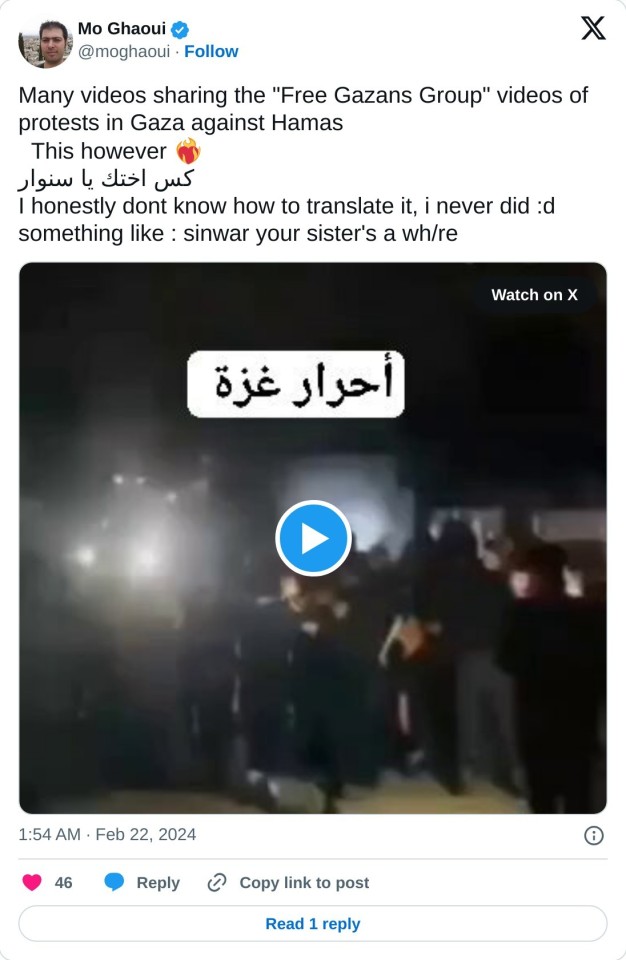
#free palestine#free gaza from hamas#free everyone from hamas it's awful#we want to live movement#free gazans group#center the people directly affected#Ironically it's almost exclusively zionists who know about and support the actual activists in Palestine#because Zionism is a real Jewish term for self-determination not something you can redefine to demonize us#and the pro-hamas movement is inherently both antisemitic and anti-Palestinian#wall of words#jumblr#jewish history#palestinian history
686 notes
·
View notes